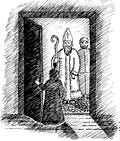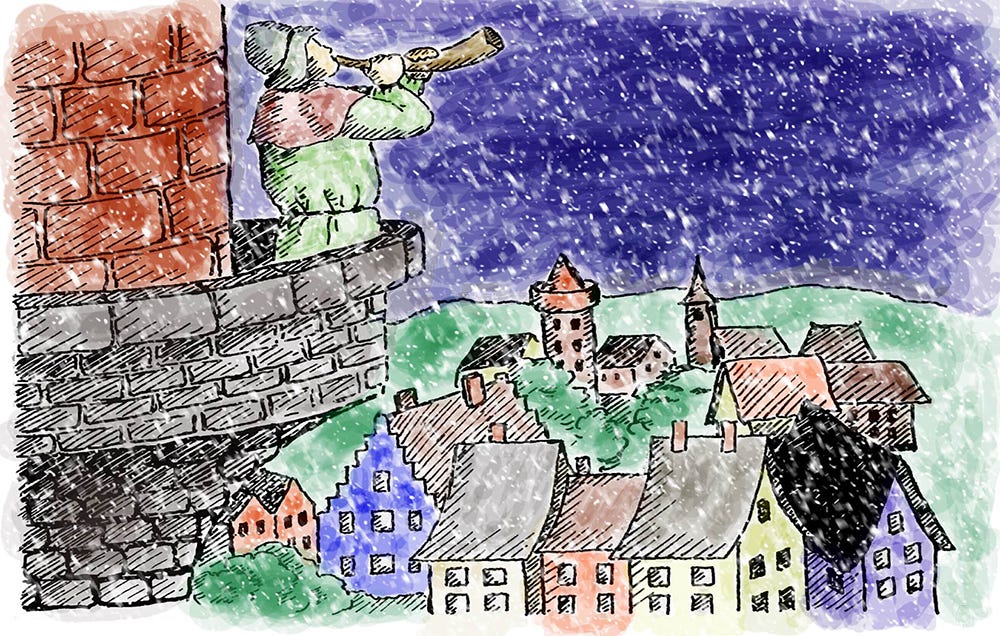St. Nickolas in Trouble (Part II)
A Story by Felix Timmermans, translated from German by Jessica Rath
Rupert smoked non-stop, it helped him to think up some good ideas, and suddenly he said: “Holy Master, now listen well! We don’t have time to return to heaven once again, and you know that heaven isn’t a revolving door for St. Peter. Plus, the oven is cold and we’re out of sugar. Here in town everybody is asleep, and both you and I are forbidden to wake anybody up. Besides, all the shops are sold out”.
St. Nickolas stroked his wrinkled forehead thoughtfully.
I don’t have to tell you how Cecily grew more and more worried by all those words. The rich ship would not land at her door! And all of a sudden she had a brilliant idea. She opened the door and stood on the doorstep in her tattered shirt.
St. Nickolas and Rupert looked startled, but Cecily crossed herself with reverence, stepped into the snow with her bare feet, and walked towards the holy friend of children. “Good evening, dear St. Nickolas,” stammered the child. “It’s not all sold out – at Trinchen Mutser’s the big chocolate ship “Congo” is still left. When she closed the shutters it was still there, I saw it!”
After he recovered from his shock, St. Nickolas shouted joyfully: “You see, it’s not all sold out yet! Let’s go to Trinchen Mutser’s! To Trinchen – but oh!” And his voice trembled with desperation. “We are not allowed to wake anybody!”
“Me neither, St. Nickolas?” asked the child.
“Bravo!” shouted the saint, “We are saved! Let’s go!”
And they walked in the middle of the street, little Cecily on bare feet in front, straight to Eggwaffle Street where Trinchen Mutser lived. In Sweetbuttercream Street their gaze fell on a lit window. Through the drawn curtains they saw the shadow of a thin, longhaired man who, holding a book and a pipe in his hand, gesticulated wildly, with his mouth opening and closing all the time.
“A poet”, said St. Nickolas and smiled.
They arrived at Trinchen Mutser’s house. The bright moonlight helped them to read the sign: “The Candied Nostril”.
“Wake her up, quickly!” said St. Nickolas. And the small child turned her back against the door and rapped at the wood with the heel of her foot. But that sounded as soft as a velvet hammer. “Stronger!” said Rupert. “If I rap stronger, it’ll work even less because my foot hurts”, said the child. “Use your fists”, said Rupert. But the fists were even quieter than her heels.
“Wait, I’ll take my shoe off, then you can knock with that”, said Rupert.
“No”, insisted St. Nickolas, “no conniving and cheating! God around us is brighter than this moonlight, and he doesn’t tolerate attorney’s tricks”. And yet, the good man would have given his finger to see little Cecily happy.
“Oh, but the guy with the monkey hair behind the curtain,” shouted Rupert joyfully, “I may call him, he isn’t asleep!” “The poet!” laughed St. Nickolas. And so, all three of them quickly went to see the poet Renoldus Keersmaker. And without much ado Rupertformed small snowballs which he threw at the window. The shadow stood still, the window opened, and the long shape of the poet who recited verses about the gods and goddesses of Olympus became visible in the moonlight, and asked from above: “Which muse has come to inspire me with songs of heroes?”
“You have to wake Trinchen Mutser for us”, called St. Nickolas, and he told about his predicament.
“Well, are you the real St. Nickolas then?” asked Renoldus.
“That I am!” And then the poet came gladly downstairs, sorted out all the dialects from his speech, bowed several times, and talked about Dante, Beatrice, Vondel, Milton, and other famous poets who he believed were in heaven. Then he was ready to help them.
They arrived at Trinchen Mutser’s, and the poet knocked and rattled at the door with such passion, that the woman jumped out of bed and anxiously opened the window.
“Is this the end of the world?”
“We come for the big chocolate ship”, said St. Nickolas, but he couldn’t explain any further. She had left the window already and came back in her nightgown, with one bare foot and one stocking in her hand, and opened the door.
She lit the lamp and walked right away behind the counter, to be at their service. She thought he was the bishop of Mecheln. “Sir Bishop”, she stammered, “here is the ship made of finest chocolate, and it costs 40 Francs.” The price was only 30 Francs, but a bishop can easily pay 10 Francs more.
But now the bomb had dropped! Money! St. Nickolas didn’t have any money, you just didn’t need it in heaven. Rupert didn’t have any money either, the child wore only a ragged shirt, and the poet chewed his long hair and beard for hunger; he owed four weeks’ rent. Cast down, they looked at each other.
“It’s for the love of God”, said St. Nickolas. Gladly he would have given his miter, but all this was lent to him from heaven, and it would have been a sacrilege to give it away.
Trinchen Mutser didn’t move and watched them darkly.
“Do it for the love of heaven”, said Rupert, “Next year I will buy up everything in your shop”.
“Do it for the sake of poetry”, said the poet dramatically.
But Trinchen didn’t move, she began to think they were dressed up thieves, because they had no money.
“Get out of here! Help! Help!” she suddenly screamed. “Get out! St. Anthony and St. Nickolas, help me!”
“But I am St. Nickolas”, said the saint.
“That’s a likely story! And you can’t produce a single penny!”
“Oh money, which poisons all brotherly love”, sighed St. Nickolas.
“Money, which messes up noble poetry”, sighed the poet.
“And which makes poor people poor”, thought little Cecily.
“But it can’t make the heart of a chimney sweep beat white!” laughed Rupert, and they went outside.
Through the moonlit night, which frost and snow kept quiet, the “Rest Peacefully” sounded hard and clear from the tower.
“Somebody else who isn’t asleep”, called St. Nickolas happily, and immediately Rupert put his foot in the door which Trichen was just going to slam shut with great anger.
“Keep that woman awake!” shouted Rupert, “I’ll be right back!”
And with that, he pushed the door open once more, and so forcefully, that Trinchen suddenly found herself sitting in a basket full of onions.
And while the others entered the store again, Rupert jumped on the little donkey, sped like lightning through the streets, stopped in front of the tower, scrambled up using turrets, protuberances, and ornaments, shingles and pictures of saints, until he reached Dries Andivel who was just scratching on his fiddle “A Hunter Rose In Early Morn”.
The man dropped fiddle and song, but Rupert explained everything to him.
“First see, then believe”, said Dries.
In the end, Rupert got him to come down and the two of them raced on the donkey through the streets to the “Candied Nostril”.
St. Nickolas dropped to his knees before the night watchman and entreated him to pay the 40 Francs, and all the happiness in the world would be his. The man was touched and said to the hard-hearted, unbelieving Trinchen: “I don’t know whether he’s lying, but isn’t this just how St. Nickolas looks in the picture books of our children, and in the church window above the christening stone? And if it really should be him! Just give him the ship! Tomorrow I’ll pay you for it!”
Trinchen thought the night watchman very trustworthy, he was from her neighborhood. And St. Nickolas got the ship.
“Now you must run home quickly, and go to sleep”, St. Nickolas said to Cecily. “We will bring the ship right away.”
The child went home, but she didn’t sleep. She sat near the fireplace with the pillow on her arm, and waited for the ship to come down. Just then the moon shone into the poor little chamber.
Oh, what did Cecily see!
There, on a glittering ray of moonlight, the little donkey was climbing up with St. Nickolas on its back, and Rupert, holding tightly onto the tail, dragged behind. The moon opened; a soft, great light fell over the snow-covered world, sparkling in all the colors of the rainbow. St. Nickola saluted the earth, and then there was only the ordinary green moonlight.
Little Cecily wanted to cry. Rupert or the good saint had not brought the ship, it was not on the pillow.
But look! What joy, the ship, the “Congo”, stood there, in the midst of the cold ashes, without a dent or scratch, radiating like silver, smoking white cotton from both chimneys!
How was this possible? How could this have happened in such complete silence? Well, nobody knows that, it is the ingenuity and great dexterity of Rupert, a secret which he won’t give away.








yay !!